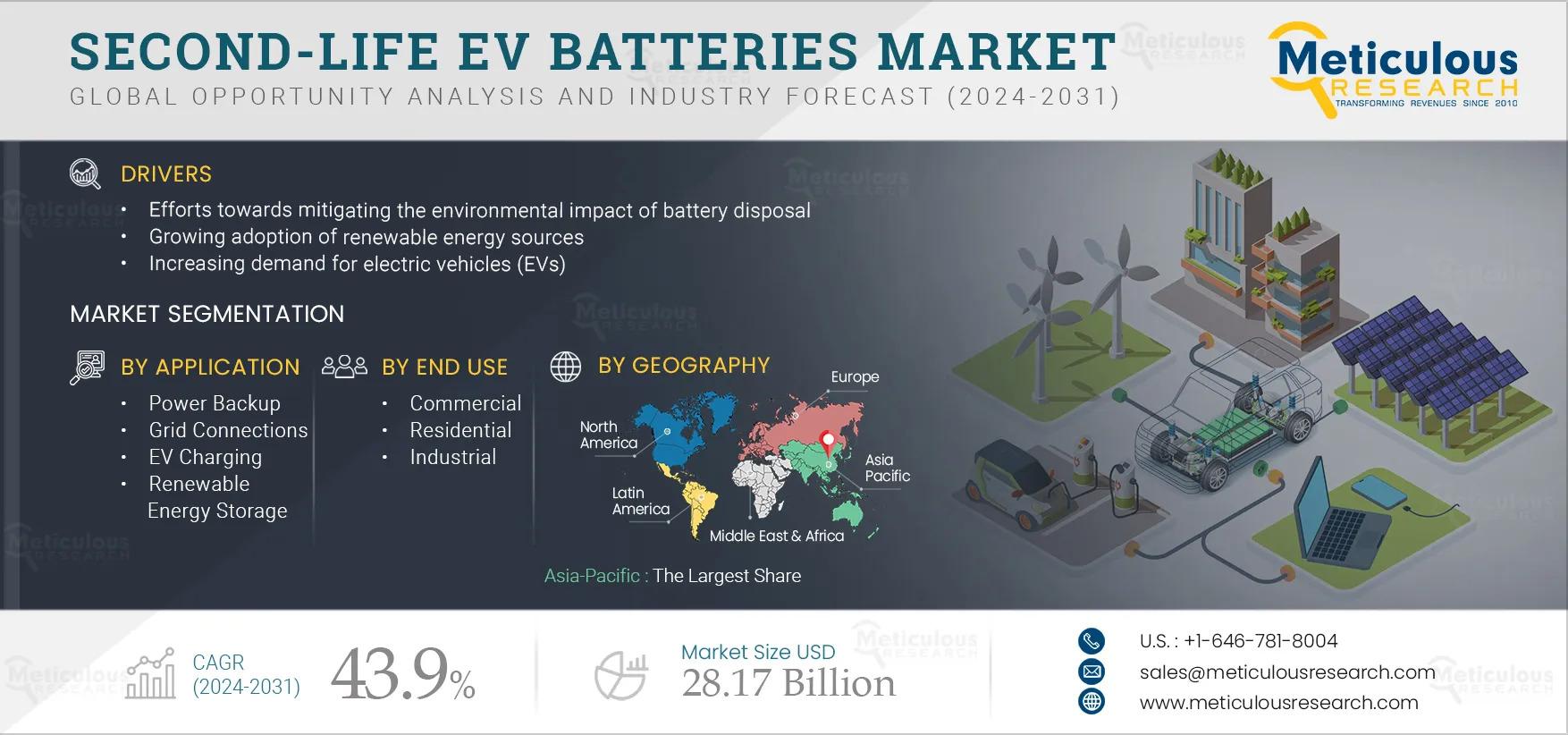Rising Demand in the Second Life EV Batteries Market

Meticulous Research®—a leading global market research company, published a research report titled, ‘Global Second-life EV Batteries Market by Application (Power Backup, Grid Connection, EV Charging, Renewable Energy Storage, Other Applications), End Use (Commercial, Residential, Industrial) & Geography—Forecasts to 2031.
According to this latest publication from Meticulous Research®, the second-life EV batteries market is projected to reach $ 28.17 billion by 2031, at a CAGR of 43.9% from 2024 to 2031. The growth of the second-life EV batteries market is driven by efforts towards mitigating the environmental impact of battery disposal, the growing adoption of renewable energy sources, and the increasing demand for electric vehicles (EVs).
We all know electric vehicles (EVs) are taking over the roads. But here's something most people don’t think about: what happens to the EV battery once it can’t power a car anymore?
Turns out, those batteries still have a lot of life left in them—just not enough for driving. And that’s where the second-life battery market comes in.
A Massive Opportunity
Instead of recycling or throwing away used EV batteries, many companies are giving them a second chance—by turning them into energy storage systems for homes, businesses, and even the power grid.
According to Meticulous Research®, this market is growing fast. In fact, it’s expected to reach, with a massive growth rate of nearly 44% per year. That’s because we’re using more clean energy, and we need smarter, more sustainable ways to store it.
Why Use a “Used” Battery?
Even when an EV battery is retired from a vehicle, it still holds about 70% to 80% of its capacity. That’s more than enough to use in places where energy demand isn’t as intense—like:
- Backup power during outages
- Charging stations
- Supporting solar panel systems
- Stabilizing the power grid
The best part? These second-life batteries are cheaper than buying brand-new storage systems—sometimes by as much as 50%.
Who’s Using Them?
Right now, businesses are the biggest users, making up more than 50% of the market. They use second-life batteries to save money on electricity, keep operations running during blackouts, and support their renewable energy goals.
Homeowners are also starting to catch on. The residential market is growing the fastest, especially as more people install solar panels and want to store their own energy.
What’s Powering This Shift?
Innovative companies are leading the charge:
- Redwood Materials is already recycling and reusing EV batteries at scale. One of their projects—a battery system with 12 MW / 63 MWh of energy—is powerful enough to support data centers.
- Smartville Inc. has launched a storage system called “360 BESS,” which reuses EV batteries in a modular, plug-and-play format.
- B2U Storage Solutions built a 25 MWh project in California using old batteries from Nissan and Honda.
These aren’t just pilot projects—they’re real-world examples of how second-life batteries are already working today.
How Do People Use Them?
It’s not just about buying a used battery and plugging it in. New business models are popping up to make things easier, like:
- Leasing batteries as part of energy-as-a-service deals
- Programs where EV owners can sell back their batteries
- Bundling second-life storage with solar power systems
These models help lower costs, spread out risks, and make it easier for businesses and homeowners to adopt clean energy solutions.
Are They Safe and Reliable?
Naturally, people wonder: are used batteries safe? Can they still perform?
The answer is yes—but they do need to be tested properly. Today, companies use smart software and AI-powered tools to check each battery’s health before it’s reused. These tools help predict how long a battery will last and how well it will perform.
Still, industry safety standards are still catching up, and more work is needed to make testing and certification more consistent.
What's the Benefit?
Second-life batteries aren’t just good for the planet—they’re also good for your wallet:
- Cost savings: Reusing a battery can save up to 50% compared to buying a new one.
- Environmental impact: Fewer batteries in landfills and less mining for new materials like lithium and cobalt.
- Energy independence: Whether it’s for your home or your business, second-life batteries can help you store and use energy more efficiently.
What About Rules and Policies?
The U.S. government is starting to support this industry through programs like the Inflation Reduction Act (IRA) and Department of Energy (DOE) funding. But there’s still a long way to go.
Right now, we need:
- Clear rules on how to test and grade used batteries
- National safety and reuse standards
- Better infrastructure to collect, ship, and repurpose batteries across states
Any Downsides?
Of course, there are some challenges:
- Not all used batteries are created equal, and their value can be hard to predict.
- Without proper regulations, some buyers may hesitate to adopt second-life tech.
- There’s still a need for better warranties and guarantees to build trust.
But as more success stories come to light, these concerns are slowly being addressed.
Final Thoughts
Second-life EV batteries are transforming what we think of as “waste.” Instead of tossing used batteries aside, we now have the tools and technology to reuse them in smart, sustainable ways.
With the market expected to hit $28.17 billion by 2031, this is more than a green idea—it’s a real solution that’s creating jobs, saving money, and helping the U.S. shift to a cleaner energy future.
The future of batteries doesn’t stop at the end of a road trip. In many ways, it’s just getting started.
Download Sample Report Here @ https://www.meticulousresearch.com/download-sample-report/cp_id=5732
Contact Us:
Meticulous Research®
Email- sales@meticulousresearch.com
Contact Sales- +1-646-781-8004
Connect with us on LinkedIn- https://www.linkedin.com/company/meticulous-research
- Art
- Causes
- Crafts
- Dance
- Drinks
- Film
- Fitness
- Food
- Jocuri
- Gardening
- Health
- Home
- Literature
- Music
- Networking
- Alte
- Party
- Religion
- Shopping
- Sports
- Theater
- Wellness


